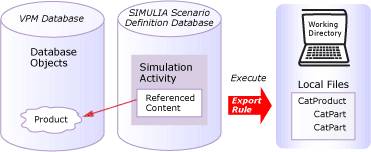About Accessing 3DSpace Data | ||
| ||
Process Composer can access objects in the 3DSpace database, such as products and simulations. You can create download rules in Process Composer to move selected objects from 3DSpace to your working directory. You cannot import data in your working directory back into 3DSpace; however, you can import the data into a document in the Process Composer database. Download rules that access 3DSpace objects are available only for simulation activities that run on an SSH execution server.
In addition, you can refer to 3DSpace data when you are creating a simulation activity.
You can export 3DSpace data to your working directory as V5-format files or 3DXML-format files.
- V5 format
You can export a product in V5 format. Process Composer creates CATPart, CATProduct, and CATDrawing files in your working directory. The V5-format files are compatible with release V5R15 and later.
- The CATPart file includes the colors, layers, and structures (part bodies, geometrical sets, etc.).
- The CATProduct file includes the product structure and instance/reference positioning.
- The CATProduct file includes the geometry of the result (only visible geometry).
See Running the Downward Compatibility Batch in the V6 Infrastructure Guide.
- 3DXML
You can export product and simulations in 3DXML. Process Composer exports all related assembly constraints, materials, and representations along with the products; see Export of Products to 3D XML in the Infrastucture Guide. Process Composer exports all of the information needed for the recipient to run the simulation; see Export of Simulations to 3D XML in the V6 Infrastructure Guide.
The following figure shows how you can access a product in the 3DSpace database and export it to your working directory. In this example the product in the 3DSpace database appears in the working directory as several CATIA V5 CATProduct and CATPart files containing geometry information.

You can move data between the 3DSpace database and your working directory as follows:
- Add referenced content to a category in a simulation activity, and select VPM data from the database. For example, you can select:
- Parts and products
- Representations (3DShape, mechanism, or FEM)
- Simulations
- If desired, you can set the referenced content to be input to the simulation activity. As a result, an impact graph of the simulation activity will include the selected 3DSpace data. However, if the 3DSpace data change, the impact graph will not show the data as being out of date.
- Select the referenced content, and create a download rule. (You cannot export 3DSpace data using a download rule by reference.) When you configure the download rule, you can select the export method (V5 or 3DXML). See Exporting 3DSpace Data for more information.
- Run the activity to export the data from the database to your working directory.